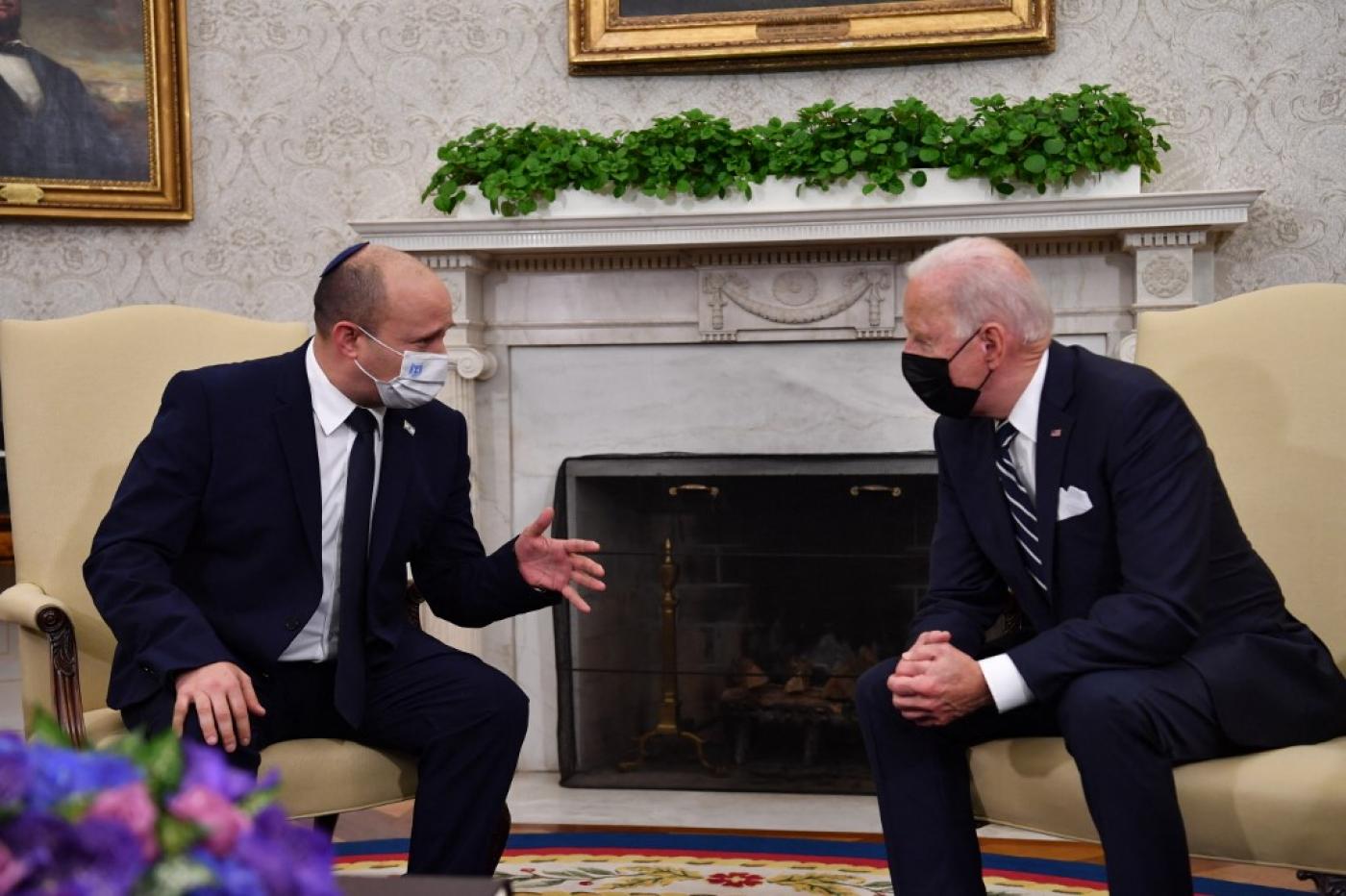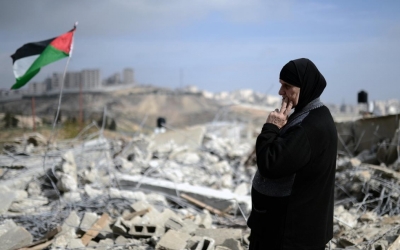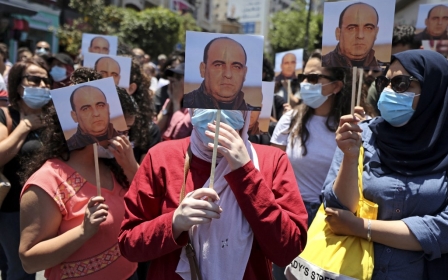How the Palestinian Authority became a prisoner of its own illusions

A recent meeting between Palestinian President Mahmoud Abbas and Israeli Defence Minister Benny Gantz has sparked an intense public outcry, deepening Palestinian divisions and pushing the prospect of unity even further beyond our reach.
The meeting last week at Gantz’s home in central Israel angered many, showing the Palestinian president’s willingness to negotiate with a minister responsible for Palestine’s ongoing occupation. It came as Israeli settler attacks against Palestinians have been on the rise, and as Israeli authorities have continued to raid Palestinian territories. It also came as Egyptian-brokered talks between Israel and Hamas appear to have stalled, threatening the resumption of military hostilities.
If that wasn’t enough, Israel has also vociferously rejected the establishment of a Palestinian state and the resumption of the peace process. Rather, Gantz says the purpose of the recent talks was to prevent the outbreak of another war with Hamas. At the same time, the US point person for the Israeli-Palestinian conflict, Hady Amr, has reportedly likened the beleaguered Palestinian Authority (PA) to “a dry forest waiting to catch on fire”.
The PA’s error lies in its agreement to one-sided concessions, without even the promise of eventual reciprocation from Israel
To understand these developments, we must go back to US President Joe Biden’s 2020 election victory, after which the PA announced the resumption of Israeli-Palestinian security coordination following a six-month pause. The head of the PA’s General Authority of Civil Affairs, Hussein al-Sheikh, described the move as a “victory”, and Israel’s Coordinator of Government Activities in the Territories subsequently affirmed Israel’s ongoing commitment to bilateral agreements.
But to take this statement at face value would be a mistake. During his recent discussions with Gantz, according to informed sources, Abbas requested Israel’s compliance on a variety of points covered by these agreements, including a halt on Israeli army raids in the occupied West Bank and an end to settlement expansion. For his part, Gantz’s hands are stained with Palestinian blood, as the former army chief oversaw the widespread destruction of Gaza in 2014.
New MEE newsletter: Jerusalem Dispatch
Sign up to get the latest insights and analysis on Israel-Palestine, alongside Turkey Unpacked and other MEE newsletters
The PA has thus chosen to resume negotiations with the occupation amid considerably lowered security and economic expectations, while also offering an olive branch to the US, where the Biden administration has pledged to reopen the American consulate in Jerusalem and the Palestine Liberation Organization (PLO)’s Washington office, and to restore Palestinian aid that was cut during the Trump administration.
One-sided concessions
The PA’s error lies in its agreement to one-sided concessions, without even the promise of eventual reciprocation from Israel. Gantz offered a series of paltry measures to the PA, including a loan on tax revenues Israel collects on Ramallah’s behalf, and a promise to legalise the status of 9,500 undocumented Palestinians and foreign nationals in Gaza and the occupied West Bank. But this is a basic Palestinian right, and the PA is paying for it through unfavourable economic and security conditions.
Why is the PA now making steeper concessions than it did under the Trump administration? There are a number of reasons. Firstly, the PA has become a prisoner to its own illusions and failed wagers. In the PA’s view, the door to negotiations must remain open - no matter how unlikely this prospect might seem - because it believes there is no alternative. The proposed framework of “economic peace” does not entail raising any contentious issues, such as the possibility of an independent Palestinian state or the cessation of Israeli colonisation.
Secondly, the PA’s hopes in the Biden administration have been dashed, especially after the US president reportedly refused to meet with Abbas. The PA is afraid that Washington will not fulfill its promises on the consulate and PLO office, while US aid has resumed at a plodding pace. The political process seems to have been indefinitely postponed, and the Biden administration’s continued push for normalisation between Israel and Arab states puts further pressure on the PA to accept what little scraps it is offered.
Thirdly, there has been a continued drop in the legitimacy, credibility and effectiveness of the Palestinian leadership in the eyes of the people, exacerbated by the indefinite postponement of Palestinian elections, ostensibly over the uncertainty of whether Jerusalemites could participate. Many Palestinians believe the real reason is the PA’s fear of losing the elections.
The PA's shoddy governance, and its failure to offer an electoral option, have destroyed its internal credibility
The PA’s crisis deepened last May, as it failed to rise to the occasion when a wave of popular unrest gripped Jerusalem and Gaza. The PA’s inability to defend Jerusalem further eroded its popularity, with polls showing that nearly 80 percent of Palestinians want Abbas to resign. The PA’s murder of activist Nizar Banat, followed by an ensuing crackdown against protesters, only fuelled the rising popular anger.
The PA’s fear that Hamas will thus once again lead the Palestinian people has pushed it to seek the occupation’s support, instead of allying with Hamas against it.
Worsening economic crisis
Added to all of this are the effects of the struggle over who will succeed Abbas after his death. The worsening economic crisis that led to the payment of only 75 percent of PA public employees’ salaries last year, with further cuts expected in the coming months; the uptick in acts of armed resistance and popular upheaval; and the PA’s dwindling legitimacy have all instigated talk of the Palestinian leadership’s collapse.
The PA’s shoddy governance, and its failure to offer an electoral option, have destroyed its internal credibility. The only source of legitimacy it still enjoys is external, bolstered by the protection of the occupation, Arab states and the US.
Clearly, the PA is desperate. While it makes occasional verbal threats about activating popular resistance, it nonetheless continues to play along with the policy of economic peace. As mentioned previously, the PA justifies this by arguing that there is no alternative - as though an alternative must fall into its lap from the sky.
In reality, the alternative must be constructed through a partnership among all political factions and forces, who can mobilise around a comprehensive and realistic national strategy. This alternative can only be built a step at a time - and it requires an unwavering commitment to self-sufficiency, reliance on the people, and a conviction that our cause is just and occupies the moral high ground.
We must rely on the readiness of the people to continue the struggle in the name of the Palestinian cause, rather than relying solely on negotiations, concessions and security coordination, regardless of the presence or absence of a political process. If there is a will, there is a way; and if there is no will, one is likely to accept anything presented before them.
Surrendering to Israel
In his recent meeting with Gantz, Abbas gained little more than crumbs, which would have eventually trickled down to him anyway, since Israel recognises that the continued existence of the PA is in its own interest.
The PA needs support to prevent its collapse, and Israel had been providing this assistance long before Abbas and Gantz met. It will continue to do so in future, as a cooperative PA functions as a benefit to Israel and its international standing. Israeli opposition to the Abbas-Gantz meeting is limited to blind extremists or politically motivated critics.
The best we can hope for from economic peace is a temporary calm before yet another storm -a storm that is all but certain
Perhaps the worst consequence of the talks between Abbas and Gantz, however, is that they reflect a brazen Palestinian accommodation of the notion of economic peace. Such capitulation will not serve to jumpstart a political roadmap; rather, it constitutes a surrender to Israel’s refusal of any political solution.
The Israeli centre, and indeed the Israeli majority, does not want a revival of the peace process - and as such, any future Israeli government is unlikely to push that process forward. This reality requires Palestinian, Arab and international pressure on Israel to change its approach. Palestinian acceptance of economic peace will not serve this purpose.
Indeed, economic peace is deceptive in its temporary effects, and cannot address the roots of the conflict or bring about lasting security and stability. The best we can hope for from economic peace is a temporary calm before yet another storm - a storm that is all but certain, as long as Palestinian rights and interests have not been fulfilled.
The views expressed in this article belong to the author and do not necessarily reflect the editorial policy of Middle East Eye.
Middle East Eye delivers independent and unrivalled coverage and analysis of the Middle East, North Africa and beyond. To learn more about republishing this content and the associated fees, please fill out this form. More about MEE can be found here.







